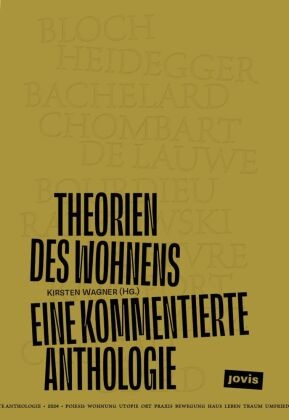Theorien des Wohnens - Eine kommentierte Anthologie
| Verlag | Jovis |
| Auflage | 2024 |
| Seiten | 656 |
| Format | 16,5 x 4,0 x 24,0 cm |
| Großformatiges Paperback. Klappenbroschur | |
| Gewicht | 1206 g |
| ISBN-10 | 3868597247 |
| ISBN-13 | 9783868597240 |
| Bestell-Nr | 86859724A |
Die Anthologie Theorien des Wohnens versammelt erstmals systematisch die zentralen Wohntheorien des 20. Jahrhunderts. Die hier ausgewählten philosophischen und soziologischen Schlüsseltexte geben einen Überblick über die verschiedenen Ansätze, Wohnen als anthropologische Tatsache, soziale Praxis und kulturelle Form zu begreifen. Über die Kommentare der Herausgeberin werden die geistes- und architekturgeschichtlichen Kontexte der einzelnen Beiträge vermittelt: So wird deutlich, dass sich jede Theoriebildung zum Wohnen direkt oder indirekt auf die während ihrer Entstehungszeit entworfenen oder bereits gebauten Räume des Wohnens bezieht. Als nach wie vor lebendiges Wissensinventar bilden die hier versammelten Beiträge auch die Grundlage für die Verhandlung gegenwärtiger Krisen und Transformationen des Wohnens, seine temporären und kollektiven Ausprägungen.
Mit Beiträgen von Gaston Bachelard, Ernst Bloch, Pierre Bourdieu, Michel de Certeau, Paul-Henry Chombart de Lauwe, Luce Giard , Martin Heidegger, Henri Lefebvre, Georges- Hubert de Radkowski, Amos Rapoport und Hermann Schmitz
The anthology Theorien des Wohnens systematically collates the twentieth century's central theories of dwelling for the first time. The key philosophical and sociological texts presented here provide an overview of the various approaches to understanding dwelling as an anthropological reality, as a social practice, and as a cultural form. The philosophical and architectural-historical contexts of the individual contributions are provided by the editor's commentary, demonstrating that each theoretical concept of dwelling refers directly or indirectly to spaces of dwelling that were being designed or already extant during the same period. The texts collected in this stimulating inventory of knowledge remain as relevant as ever, and offer a basis for engagement both with current crises in dwelling and with transformations of its temporary and collective forms.
With contributions by Gaston Bachelard, Ernst Bloch, Pierre Bourdieu, Michel de Certeau, Paul-Henry Chombart de Lauwe, Luce Giard, Martin Heidegger, Henri Lefebvre, Georges-Hubert de Radkowski, Amos Rapoport, and Hermann Schmitz

